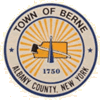History
Links to Histories for other Hilltowns are HERE.
Scoharie was settled by Palatine Refugees 1712 from what is now Germany. The earliest settlers of what is now Berne were both newer Palatine arrivals who found that the land in the Schoharie Valley was already taken, and early settlers who either could not get clear title too their land, or did not (or could not) pay the price. At that time, the wilderness land to the east in what is now Berne and Know could be had for the taking.
Without a doubt, the Ball and Dietz families were among the earliest settlers in the Helderbergs, and by 1740 were living next to each other on the flats below what is now the hamlet of Berne. This is evidenced by the marriage of three sons of Peter Ball, (whose parents were part of the 1709 – 1710 refugees brought by the British from London), to three Dietz women. Since these marriages were recorded in Schoharie, some historians believe that Peter Ball first settled in Schoharie, however there are no records to support this.
Sometime before 1757 the area surrounding what is now the hamlet of Berne was referred to as “the Beaver Dam” – after a large beaver dam on a small tributary of the Foxenkill just west of the junction of the Switzkill.
Early Settlement The earliest settlers were Palatine German refugees. Settlement began before 1750. At that time it was called Beaver Dam (also spelled Beaverdam). The settlers were actually squatters, since in the 18th and most of the 19th centuries, Berne was part of the Rensselaerwyck estate. The head of the Van Rensselaer family was the Patroon who owned all the land on which the tenants in the Hudson Valley lived, and used feudal leases to maintain control of the region. Before the Revolutionary War, the patroons acted as feudal lords, with the right to make laws.
Beaver Dam The Beaver Dam - The first chapter of Our Heritage starts: "As nearly as can be determined... it was 1750 when Jacob Weidman led a small band of settlers along an old Indian trail through the Helderbergs. Weidman, Ball, Bassler, Deitz, Hochstrasser, Knieskern, and Zeh - where or how did they meet? Probably we shall never know." The story of Weidman leading a group of first settlers is not true. This article, originally publishled in the Altamont Enterprise has more information on the early settlers of Berne.
When the first settlers arrived in the wilderness, probably before 1740, they squatted near a large beaver dam that was probably located on the Switzkill creek just before it joins the Foxenkill (Fox Creek) west of the current hamlet of Berne. Although determining the exact year is impossible, it is certain that they were squatters since all of the land in the area was then owned by the Van Rensselaer family and had been for more than a century. The settlement was referred to as Beaver Dam - also spelled Beaverdam and misspelled as Bever Dam.
Local History
- Slavery in Berne - It was generally the earliest settlers, who had settled on the best valley land, who were prosperous enough to afford them. In 1827 slavery was outlawed in New York State.
- Fischer / Wood Farm - In 1790 census for the Town of Rensselarville listed Johannes Fischer, the innkeeper who built The Johannes Fischer House, as one of the few local families to own slaves. About 1812 Fischer built a large, one-room brick building to house his three slaves, plus those of travelers staying in his inn. Conveniently located behind it is an outdoor brick beehive oven. There are slaves buried in back of the Wood Family Burying Ground. The slave quarters and oven still exist. Euretha Wolford Stapleton, former Town Historian, said this farm was a stop on the Underground Rail Road that helped run-away slaves reach their freedom farther north or in Canada.
- Anti-Rent Wars in the Hilltowns
- Berne during the Anti-Rent War
- brief histories of Berne published in various books and newspapers.
- Berne History - Landmarks of Albany County, New York
- Timeline of Berne History
- NYS Historic Markers in Berne
- Berne Census Records for 1790, 1800, 1840, 1850, 1855, 1860, 1865, 1905, 1915, and 1925 are transcribed and posted on Berne History Project web site.
